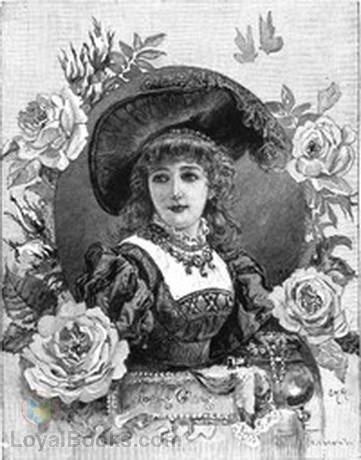|
Books Should Be Free Loyal Books Free Public Domain Audiobooks & eBook Downloads |
|
|
Books Should Be Free Loyal Books Free Public Domain Audiobooks & eBook Downloads |
|
Lady Clare By: Alfred Tennyson Tennyson (1809-1892) |
|---|

Alfred Tennyson Tennyson’s Lady Clare is a remarkable narrative poem that delves into themes of love, duty, and societal expectations. Set in medieval times, the story follows the eponymous Lady Clare, a young woman whose heart is torn between her love for a lowly peasant lad and her duty to marry a nobleman.
First and foremost, Tennyson demonstrates his exceptional storytelling abilities through the vivid imagery and descriptive language employed throughout the poem. The author expertly brings to life the medieval setting, transporting readers to a world of knights, castles, and chivalry. With eloquent and lyrical verses, Tennyson paints a picture so rich that readers can almost feel the cold stone walls and hear the echoes of footsteps within the halls.
One of the most captivating aspects of Lady Clare is the exploration of love in its various forms. The poet deftly portrays the intensity of romantic love between Lady Clare and the peasant lad, illustrating their clandestine meetings and whispered promises. This forbidden love evokes strong emotions and stirs the reader's sympathy for both characters, caught between their hearts' desires and societal expectations.
Furthermore, Tennyson also weaves in themes of familial love and duty. Lady Clare's predicament lies not only in her forbidden love, but in the pressure she faces from her family to marry for social status and wealth. Through her internal conflict and her interactions with her family, Tennyson delves into the complexities of duty versus personal desires, highlighting the sacrifices and difficult choices faced by individuals in such hierarchical societies.
While the poem primarily focuses on Lady Clare's journey, Tennyson also presents a vivid array of supporting characters that add depth and nuance to the narrative. Each character is carefully crafted and serves a purpose in moving the story forward. From Lady Clare’s mother, steadfast in her determination for her daughter to marry well, to the elderly nurse, full of wisdom and advice, each character offers insight into the societal norms and expectations prevalent during that era.
Although this narrative poem possesses many commendable qualities, some readers may find the rhyme scheme and meter to be challenging. Tennyson utilizes a specific pattern, which can occasionally feel rigid and restrict the natural flow of the poem. However, this adherence to form also showcases the poet's mastery of his craft, and may be appreciated by those who enjoy classic poetic structures.
In conclusion, Lady Clare by Alfred Tennyson Tennyson is a captivating narrative poem that skillfully explores timeless themes of love, duty, and societal expectations. With his exquisite use of language and vivid imagery, Tennyson brings the medieval setting to life, captivating readers from start to finish. While the strict rhyme scheme may prove challenging for some, it ultimately adds to the poem's overall craftsmanship. Fans of classic poetry and those intrigued by tales of forbidden love and the clash between personal desires and societal dictates will find themselves enraptured by Lady Clare. by Alfred Tennyson 22 illustrations by Alfred Fredericks, Granville Perkins, Frederic B. Schell, Edmund H. Garrett, F. S. Church and Harry Fenn [Transcriber's Note: these illustrations are available in the HTML format of this file.] List of illustrations: Lady Clare, by Alfred Fredericks Lady Clare, by Alfred Fredericks Headpiece, by Edmund H. Garrett Vignette, by Edmund H. Garrett "It was the time when lilies blow", by Frederic B. Schnell "Lily white doe", by Frederic B. Schnell "I trow they did not part in scorn", by Alfred Fredericks "He does not love me for my birth", by Frederic B. Schnell "In came old Alice the nurse", by Alfred Fredericks "'Oh, God be thanked!' said Alice the nurse", by Granville Perkins "Are ye out of your mind, my nurse, my nurse", by Alfred Fredericks "Falsely, falsely have ye done", by Frederic B. Schnell "'If I'm a beggar born,' she said", by Alfred Fredericks "'Nay now, my child.' said Alice the nurse", by Granville Perkins "Yet give one kiss to your mother, dear!", by Alfred Fredericks "She clad herself in a russet gown", by Alfred Fredericks "The lily white doe Lord Ronald had brought", by F. S. Church "Down stepped Lord Ronald from his tower", by Granville Perkins "If I come dressed like a village maid", by Alfred Fredericks "'Play me no tricks,' said Lord Ronald", by Edmund H... Continue reading book >>
|
| This book is in genre |
|---|
| Literature |
| eBook links |
|---|
| Wikipedia – Alfred Tennyson Tennyson |
| Wikipedia – Lady Clare |
| eBook Downloads | |
|---|---|
|
ePUB eBook • iBooks for iPhone and iPad • Nook • Sony Reader |
Kindle eBook • Mobi file format for Kindle |
|
Read eBook • Load eBook in browser |
Text File eBook • Computers • Windows • Mac |
| Review this book |
|---|